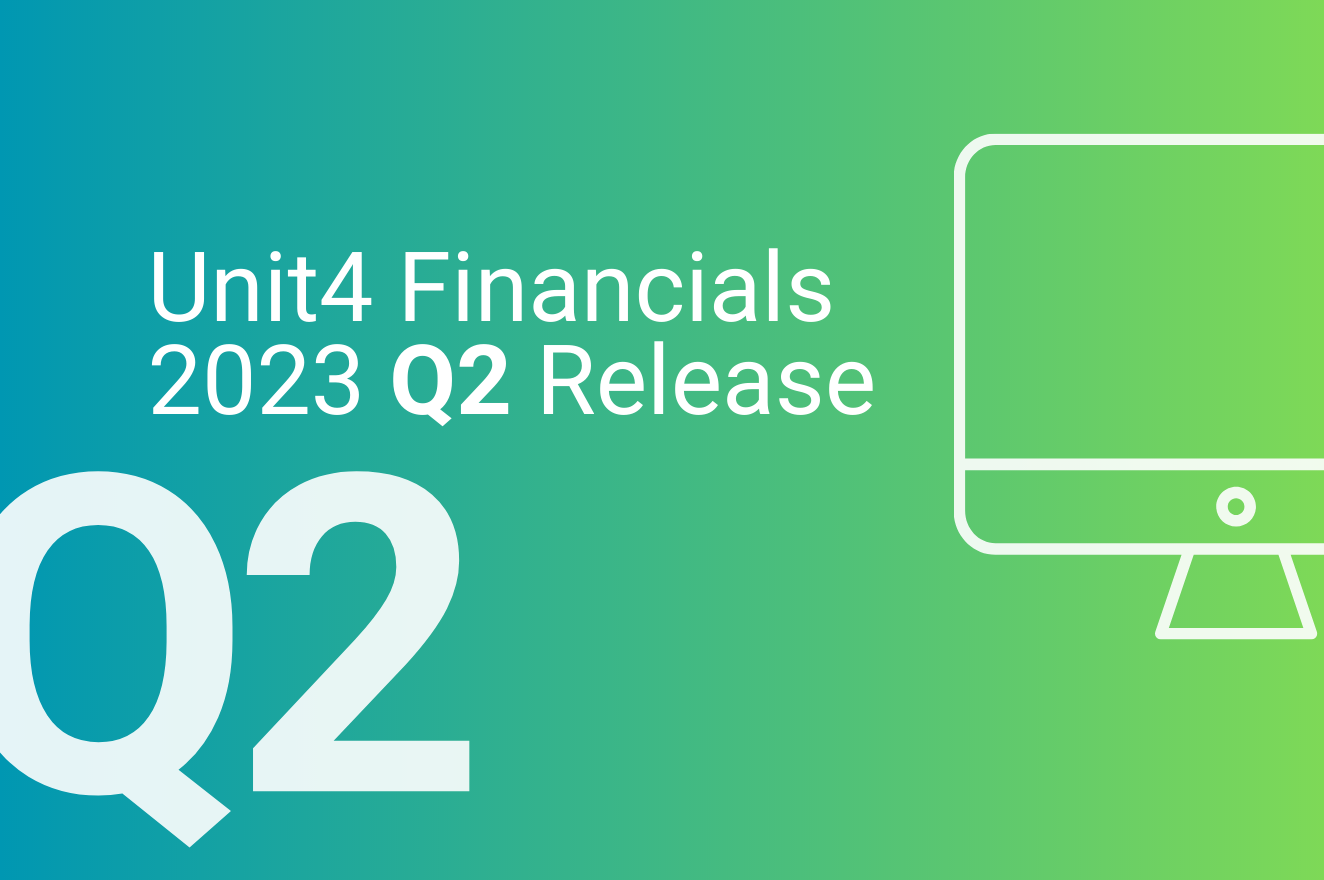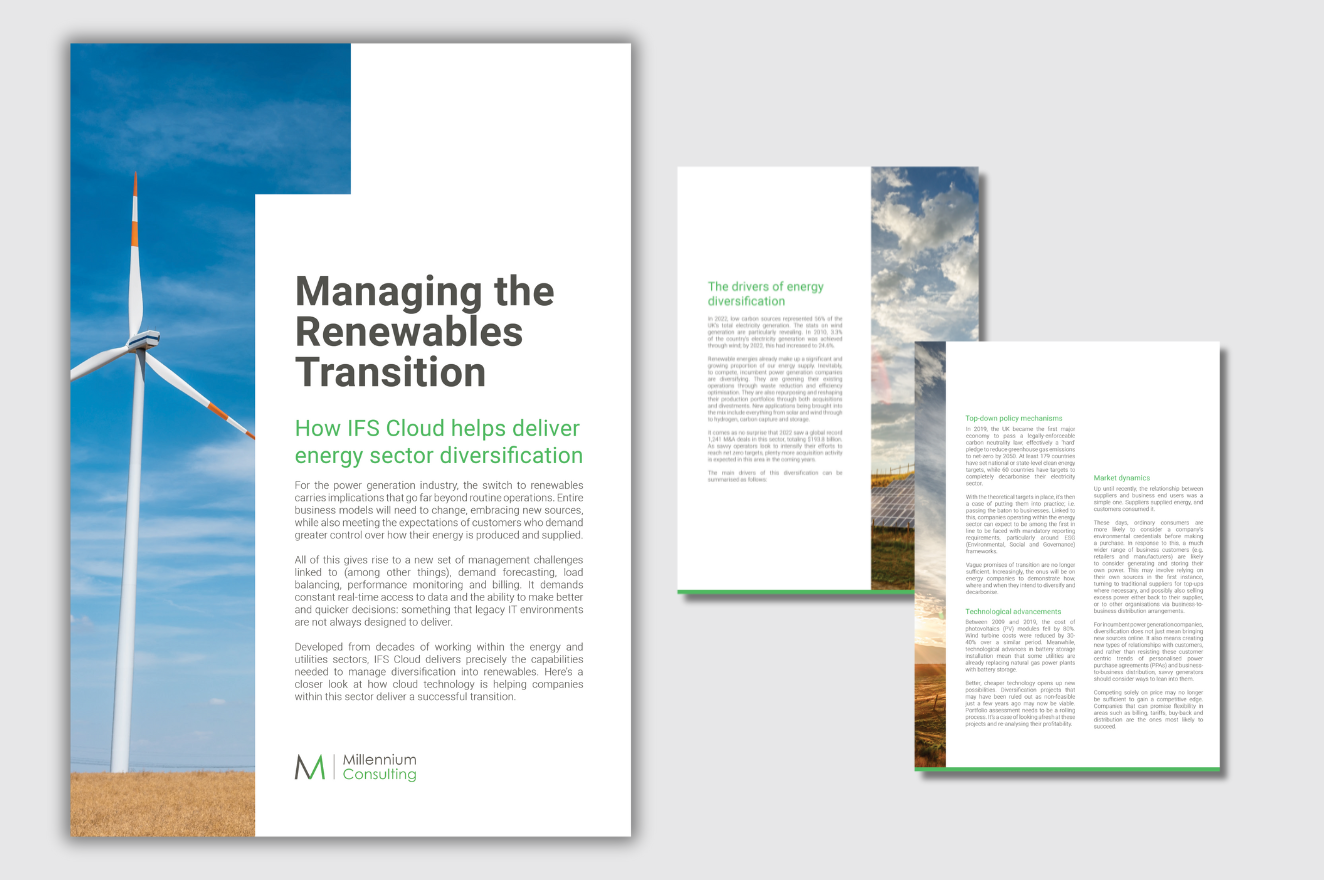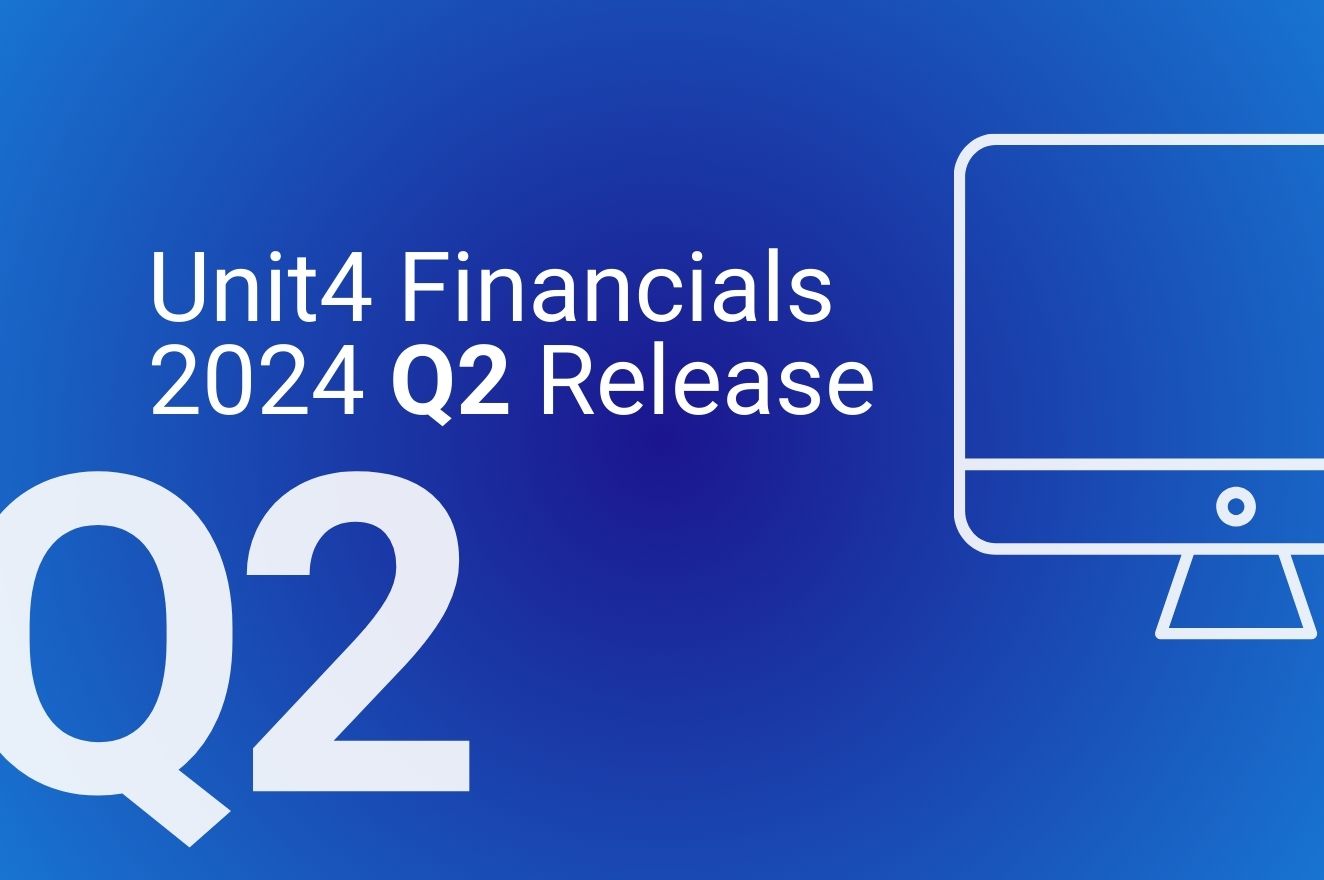Realising successful Oil & Gas Digital transformation
June 2023
Realising successful Oil & Gas Digital Transformation: What makes IFS the best fit?
With a complex mix of services to manage and challenges to meet, oil & gas decision makers cannot afford to take risks with business-critical software. Sector-specific expertise is a must…
Decision makers approach software procurement with certain outcomes in mind. Typically, these include a desire to improve operational efficiency, boost productivity and gain more effective control over project management. The end goals are improved margins and a more resilient business.
To reach those desired outcomes, a complex operating environment calls for careful choice of technology. This is particularly true for finance leaders in the oil & gas sector who are grappling with a volatile market, rising operating costs, a scattered portfolio of assets to manage and increased regulatory oversight, including pressure to reconfigure the entire business model in line with ESG frameworks.
Challenging conditions call for proven, sector-specific technological solutions. This is where IFS comes in: a global leader in enterprise software, with solutions that cover Enterprise Resource Planning (ERP), Field Service Management (FSM), Asset Management and more.
To date, IFS applications have been deployed successfully in more than 400 projects by oil & gas companies. Here’s a closer look at the reasons why IFS solutions are the ideal fit for the exacting needs of this particular sector.
Ensuring continuity while driving efficiency
The challenge
Finance leaders and operational managers in the oil & gas sector tend to have complex and often competing priorities to juggle. These include the following:
- Continuity of supply. While security of supply is not a new concern, the war in Ukraine has pushed it to the top of the political agenda. In the current climate, an unplanned major outage is as much a political issue as an operational one.
- Cost reduction. In areas such as asset maintenance, this includes optimising inventories of spares and equipment, along with reduction of procurement and shipping costs.
- Alongside any initiatives in play to improve the efficiency of offshore operations, the highest standards for safety and environmental management need to be maintained.
The solution
The IFS cloud-based ERP solution comes with precisely the capabilities planners and operational managers need to meet the challenges associated with the management of offshore assets.
For instance, in the context of maintenance, robust ‘spares & repairs’ inventory functionality makes it possible to plan with accuracy for long lead times in custom fabrication, as well as transport order management.
More accurate resource planning provides greater scope for optimising inventories, lower levels of redundancy, healthier cash flow – as well as the possibility of greater leeway for negotiating lower equipment costs.
On the operational side, it can also mean reduced unplanned downtime and fewer delays due to equipment unavailability.
Eliminating silos
The challenge
Effective planning requires sight of the whole picture. This, however, is often easier said than done: particularly for an enterprise that comprises multiple assets in dispersed locations, and with production flows that span numerous drilling contractors, vessel owners and a multitude of other supply chain partnerships.
The solution
IFS enables you to break down the data silos that can emerge across scattered operational sites. In their place, you can have one version of the truth, and one set of numbers for the entire organisation.
For finance leaders, the solution can help deliver total real time visibility of the global business, including finance, project and asset management, as well as insights on performance across the entire on and off-shore supply chain.
Assets that are ‘in the dark’
The challenge
Collating transactional information from across the enterprise can be a challenge for any finance department. This is especially true for the case of the oil & gas sector – particularly when it comes to the reliable transmission of key financial information from isolated offshore units to onshore locations.
The solution
With experience of meeting the needs of the energy sector since the software’s inception, IFS is well aware of the challenges surrounding the management of scattered assets. Customers get the benefit of IFS Instant Replication as standard. This uses satellite technology to ensure that offshore operations always have system support – even in areas where communication links are poor.
On the other side, IFS Instant Replication also means that your onshore finance hub can always have access to current information on the status of each offshore asset: everything from serviceability and maintenance inventory on hand, through to data on that asset’s performance and contribution to cost and revenue.
Cross-geography initiatives
The challenge
Collating transactional information from across the enterprise can be a challenge for any finance department. This is especially true for the case of the oil & gas sector – particularly when it comes to the reliable transmission of key financial information from isolated offshore units to onshore locations.
The solution
With experience of meeting the needs of the energy sector since the software’s inception, IFS is well aware of the challenges surrounding the management of scattered assets. Customers get the benefit of IFS Instant Replication as standard. This uses satellite technology to ensure that offshore operations always have system support – even in areas where communication links are poor.
On the other side, IFS Instant Replication also means that your onshore finance hub can always have access to current information on the status of each offshore asset: everything from serviceability and maintenance inventory on hand, through to data on that asset’s performance and contribution to cost and revenue.
Project management
The challenge
Especially when under intense pressure to lower overheads, agility is key when it comes to project management. When a viable new opportunity has been identified, rarely is it a case of being able to follow a cookie-cutter workflow. Success depends on the analysis of multiple unique dependencies, along with the ability to track cost, risk and timings in real-time.
Furthermore, problems can arise when organisations have discrete technologies in play for project management and asset management – particularly when it comes to questions over which projects to prioritise in the allocation of limited enterprise resources.
The solution
IFS offers organisations a truly integrated view of performance, with tools that include both project management and asset management via a single platform. This provides for greater visibility, more efficient risk management, and helps ensure resources are allocated and reallocated to deliver the greatest possible value.
Discover more
As a premier IFS Managed Service Provider, Millennium Consulting is ideally placed to support companies across the oil & gas sector as they seek to achieve maximum return on their tech investment.
Please get in touch to discover what’s possible through the IFS platform.
Unit4 Financials 2023 Q2 Release
June 2023
Unit4 Financials by Coda 2023 Q2 was made available on 13 June 2023.
The new release contains all the previous Unit4 Financials functionality and new features. Plus, many additional customer requested fixes, highlighting the importance of logging enhancements via Unit4’s Community 4U.
Highlights of the 2023 Q2 release include:
Administration
- Output Device Master
- Logon Event Housekeeping
- Scheduled Tasks
Technical
- New WildFly scripts
- Added HTTP security headers in WildFly
- ODBC Driver for SQL Server
Deprecated features
- 32-bit XL is deprecated. We recommend the use of 64-bit XL.
- The Message Board feature in Administration is deprecated. It will be removed in a future release.
General Fixes/Updates
An error is no longer shown when creating an Element Authorisation Rule Master that references Entity Masters which have disabled Element Statuses.
- Allowed user to save a message transport master when the password contains an asterisk.
- It is now possible to add a new field to a Flexi-Field Master without removing the associated Metadata Object Definition join from all affected Dataviews. The new vocabulary will have to be added to any required Dataviews manually.
- It is now possible to remove a generated matching line without getting an error when using a Tabular Input Template Master or when resolving the document before posting.
- ITK is not disabled by database connection problems during server start.
- All repository objects, including attachments, are now written to the disk, which allows for virus scanning before they are saved.
- The response returned by the ComSelectorMaster.List service now matches the schema.
- The response returned by the GenericBrowse.SelectForTransaction service now matches the schema.
- The response returned by the PresenterMaster.Get service now matches the schema.
- Element Long Name will also be updated when the Element Name is edited in Assisted Element. Reloading the Element will now reload the Long Name correctly if it exists.
- ‘Negative rate calculated’ errors in matching have been fixed.
- Account Summary now allows changes to be saved when it is accessed from a homepage/content provider.
- When running a scheduled task manually, the confirmation message has been enhanced.
- Degrading performance during matching and other applications has been addressed.
- When the Credit Limit required checkbox is ticked in Assisted Element, the user is no longer returned to the template code selection screen. Unticking the Credit Limit required checkbox will reset the Credit Limit to 0.
- ITK Data Editor now saves changes to monetary and other big numerical values correctly.
- Documents posted to intray with invalid data no longer introduce a checksum error.
- The ITK INPF process step will now handle UTF-8 with BOM encoded input files.
- When performing a quick print of a pay proposal, document lines are no longer duplicated when an External Reference URL field is populated and specified on the Selected Details presenter on the Pay/Collect master.
- When retrieving large amount of data using Generic Browse, the amount of memory used is reduced.
- The Tablelink transfer client (API) no longer causes the system to hang.
- An error is now given if you try to use assisted element with an umbrella element.
- Returning from viewing a log no longer writes an error stack trace to the container log.
- A serious error is no longer displayed in workflow when non-unicode characters are included in the document comments.
- Changing the document date in Billing will cause the currency exchange rates to be recalculated if the Company Master exchange rate date setting is ‘Document’.
- The diagram in the installation requirements has been updated to make it clearer that a clustered deployment requires a shared JMS environment
- Fixed Path Traversal Vulnerability in the Customiser. More information on the vulnerability on the OWASP website.
- Fixed XML External Entity Injection (XXE) vulnerability in XMLi. More information on the vulnerability is available on the OWASP website.
- The source transactions are preserved when capitalising assets with temporary numbers.
Further details on the new features, security updates and reported issues can be found in the release documentation on Unit4’s Community 4U.
Unit4 Financials by Coda 2023 Q1 was made available on 14 March 2023, find here.
Release dates for Cloud users
Unit4 Cloud customers are notified by Unit4 Cloud support when their pre-production and production systems will be updated. This information can also be found within the Cloud Services – Release Schedules area. View the 2023 Cloud Schedule here.
The Release Notes detailing the fixes and features within this release can be found in the Documentation area on Unit4’s Community 4U.
Upgrading Financials is not merely about accessing the new functionality that comes with a new software release. It is also about mitigating technology, operational, and business risk.
Managing the Renewables Transition
June 2023
Managing the Renewables Transition
How IFS Cloud helps deliver energy sector diversification
For the power generation industry, the switch to renewables carries implications that go far beyond routine operations. Entire business models will need to change, embracing new sources while also meeting the expectations of customers who demand greater control over how their energy is produced and supplied.
Developed from decades of working within the energy and utilities sectors, IFS Cloud delivers precisely the capabilities needed to manage diversification into renewables. Take a look at this white paper as we explore how cloud technology is helping companies within this sector deliver a successful transition.
Unit4 Financial by Coda Cloud: Your Future State Architecture
September 3, 2024
Unit4 Financials 2024 Q2 Release
June 11, 2024
Millennium Unit4 Financials by Coda Conference watch now
2023
Millennium Unit4 Financials by Coda Conference round up
Millennium Consulting held the ninth annual Unit4 Financials by Coda Conference on Thursday 25th May 2023 at the RSA, London.
The event was opened by Millennium Consulting’s COO, Jeremy Lucas, who also compered the event. The morning started with three presentations from the lead sponsor Unit4; Dave Anstey, Engineering Director, began with a keynote update on the recent commitments and investments made in Financials by Coda, followed by Jane Dolan, Product Owner, who provided a detailed product update. Before the mid-morning break Oliver Sullivin, Sales Growth Director for FP&A, shared a session on the value and functionality offered by FP&A Lite.
The mid-morning sessions started with Chris Peall, Director of Professional Services at Millennium, presenting Millennium+. Next, we heard from our first sponsor, Avalara, followed by a presentation on Complex Billing, the solution from our partner ICORP. Luke Sherratt at Scanmarket rounded up this session.
After lunch, Benoit Dallaporta, Cloud Migration Team Manager at Unit4 and Chris Peall explained that Cloud is great for everyone! Millennium’s cyber security expert, Ben Hart, then took to the stage to explain the importance of cyber resilience. At 3 pm, we welcomed a panel of experts to the stage. During the live Q&A, the experts; Phil Leaf, Jawaid Maqbool, Chris Peall and Ben Hart answered questions from delegates and presented different perspectives, creating a lively discussion in the auditorium.
The day ended with presentations from Good Business Charter and Gold sponsor, Trintech.
"The Millennium Unit4 Financials by Coda conference returned this week, and it turned out to be one of our best conferences yet, with many interesting and informative presentations. I want to thank everyone who attended and give a special thanks to our sponsors, who greatly contributed to the event's success."
— Jeremy Lucas, Chief Operating Officer at Millennium Consulting
Register for early access of the recordings
Did you miss the conference, want to catch up on sessions you could not attend on the day or wish to rewatch? All presentations were recorded and will be available to watch. Register now to be the first to know when the videos are live.
If you’re considering undertaking an upgrade, a systems review, transformation programme or are getting set to move to ERP or ERPx, get in touch to find out how we can help with that journey.
Millennium Raising Futures Kenya Golf Day 2023
2023
The Millennium Raising Futures Kenya Golf Day round up
We raised £5,000 for Raising Futures Kenya
It's always amazing how the weather seems to cooperate during the Millennium Raising Futures Kenya Golf Day. This year was no exception - the bright sunshine was a sight to behold. However, as is typical with the UK weather, grey clouds loomed in the distance. Nonetheless, it was a fantastic day at Sittingbourne Golf Club in Kent.
It was an exciting day for golf enthusiasts as players from different teams gathered to compete for the coveted Millennium Golf Challenge trophy. The USA team emerged victorious this year, with Ray Seamer leading the way as their captain and scoring an impressive 489 points. The team’s Stableford winners were Ben Hunt, Matthew Hunt, Sonny Merril, and Stephen May, who scored a total of 94 points.
Aside from the main competition, other prizes were also awarded for the longest drive and closest to the flag. Four players even managed to beat the professional in the Beat the Pro competition – Tom Edmonds, Mark Barnard, David Blake, and Maartin Heukshorst.
After the game, the players gathered for a post-round dinner where Jane Keet shared an insight about Raising Futures Kenya and the activities taking place on the ground in Kenya. She also highlighted the value of the Millennium golf day support. The dinner was followed by a raffle and auction, which raised a great amount.
The success of the event was made possible by the generous support of Unit4, ICORP, and Arbonne International.
Congratulations to the USA team and all the winners!
Here are some of the highlights:
The day generated £5,000 for Raising Futures Kenya and the money will be put to good use helping young Kenyans.
We look forward to reconvening in 2024 for the next event, and the date and location will be announced in the coming months. We welcome new participants, so if you would like to play next year, contact the Millennium team, who will be happy to provide you with the details.
Charity
Raising Futures Kenya
We firmly believe in our social responsibility to the wider community. That’s why, over the last 17 years, we have supported Raising Futures Kenya – a charity that breaks the cycle of inequality and creates opportunities for vulnerable children and young people in Kenya.
Raising Futures Kenya is the charity working together with young people to create opportunities for rewarding futures. Without these opportunities, one in five young people in Kenya face living in poverty; unable to reach their potential.
Millennium Unit4 Financials by Coda Conference round up
2023
Millennium Unit4 Financials by Coda Conference round up
Millennium Consulting held the ninth annual Unit4 Financials by Coda Conference on Thursday 25th May 2023 at the RSA, London.
The event was opened by Millennium Consulting’s COO, Jeremy Lucas, who also compered the event. The morning started with three presentations from the lead sponsor Unit4; Dave Anstey, Engineering Director, began with a keynote update on the recent commitments and investments made in Financials by Coda, followed by Jane Dolan, Product Owner, who provided a detailed product update. Before the mid-morning break Oliver Sullivin, Sales Growth Director for FP&A, shared a session on the value and functionality offered by FP&A Lite.
The mid-morning sessions started with Chris Peall, Director of Professional Services at Millennium, presenting Millennium+. Next, we heard from our first sponsor, Avalara, followed by a presentation on Complex Billing, the solution from our partner ICORP. Luke Sherratt at Scanmarket rounded up this session.
After lunch, Benoit Dallaporta, Cloud Migration Team Manager at Unit4 and Chris Peall explained that Cloud is great for everyone! Millennium’s cyber security expert, Ben Hart, then took to the stage to explain the importance of cyber resilience. At 3 pm, we welcomed a panel of experts to the stage. During the live Q&A, the experts; Phil Leaf, Jawaid Maqbool, Chris Peall and Ben Hart answered questions from delegates and presented different perspectives, creating a lively discussion in the auditorium.
The day ended with presentations from Good Business Charter and Gold sponsor, Trintech.
"The Millennium Unit4 Financials by Coda conference returned this week, and it turned out to be one of our best conferences yet, with many interesting and informative presentations. I want to thank everyone who attended and give a special thanks to our sponsors, who greatly contributed to the event's success."
— Jeremy Lucas, Chief Operating Officer at Millennium Consulting
Watch the Millennium Unit4 Financials by Coda Conference recordings
Did you miss the 2023 conference, want to catch up on sessions you could not attend on the day or wish to rewatch? All presentations were recorded and are available to watch, click the link below.
If you’re considering undertaking an upgrade, a systems review, transformation programme or are getting set to move to ERP or ERPx, get in touch to find out how we can help with that journey.
Finance Transformation Guide
May 2023
Finance Transformation Guide
This guide covers the areas you must focus on when managing significant change within your finance department. It outlines the elements you need to have in place before, during and after transformation, along with best-practice management tips.
Millennium Unit4 Financials Conference Programme
Event Programme
Millennium Unit4 Financials by Coda Conference
Use this programme to view the upcoming presentations. In addition, it can be used as a quick reference point on the day.
Get in touch
From the latest version of Unit4 Financials by Coda to the modules and add-ons that streamline your processes, we are the experts in helping you deliver Finance Transformation.
We are an Elite Unit4 partner and a leading reseller around the world. That means we have the knowledge and experience to design, implement and support the correct Financials solution for your business.

World Password Day 2023
4th May 2023
World Password Day
Started in 2013 by Intel, World Password Day is designed to raise awareness of the role strong passwords can play in securing our digital lives. Now more than ever, with the increasing frequency and sophistication of cyberattacks, it has become essential for individuals and organisations to keep up with best practices for password management. Although strong passwords are not a cure-all for making your organisation Cyber Resilient, they are still one of the best security measures. However, technology and cyber-criminals approaches are ever-changing, meaning advice can change over time.
Today we want to help raise awareness, not only on what is good advice for strong passwords in 2023 but also the reason why. So here are a couple of ways cyber-criminals get hold of passwords and how to defend against them.
In brute-force attacks, an attacker leverages high-speed computing power to try every character combination to break a password or password hash*.
Hive systems’ research gives an idea of the time frame to brute-force a password with that year’s technology. According to their 2023 table, the time to break a complex (numbers, upper and lowercase letters, and symbols) 8-character password in five minutes, and a 14-character complex password should take 1 million years to brute-force.
So, the longer a password, the longer it can take to be brute-forced; the same goes for the complexity of a password; the same 8-character long password, just using lower case could be brute-forced in less than a second, and a 14-character password in about a year.
Consider the growth of computer power and access to powerful cloud computing instances and think ahead; the same 8-character password now down to 5 minutes would have taken around 8 hours to crack six years earlier.
So, to defend against brute-force attacks, a password should be long and complex.
*Passwords do not usually get transferred across a network or the internet; typically, an application converts the password using a special one-way algorithm into a password hash, so the password-checking function only checks that the received password hash is the same as the stored password hash.
Phishing is where an attacker deceives people into revealing information or performing an action. A phishing attempt could be simple (designed to capture the one person in a thousand who doesn’t spot the danger) or complex and very carefully targeted (even security professionals fall for phishing!). One purpose of phishing is to lead people to fake login pages that harvest their passwords.
Keyloggers come in many forms and have legitimate uses. Still, in this context, an attacker might use malware to read and store all the keystrokes on a computer, capturing passwords and sensitive information.
Passwords gained from phishing, keyloggers, and breaches all tend to find their way into large password lists, used to either speed up brute-force attacks (dictionary attacks) or can be used to speed up the breaking of password hashes.
A compromised password is likely to be used in further attacks; if associated with an identity (an email, for example), any related accounts could be in danger if they use the same or similar passwords.
A good defence against compromised passwords is to use a new password for every account. It will not save the breached account but protect your other accounts.
Enforcing a password policy across every account a user needs to do their daily jobs is almost impossible. It is also difficult for users to remember multiple 14-character complex passwords. Users may use bad practices, like a breach of policy, reusing passwords, writing passwords down next to workstations, or saving them in documents.
- There are lots of ways to help users and defend against bad practices:
Help users by using single sign-on (SSO) services with an account that can use them and password managers for everything else. These will help users have different and complex passwords* - Consider scraping regular password updates; they encourage enumeration (adding a number to the previous password); this is almost as bad as reusing the same password, as many dictionary attacks will enumerate previously breached passwords. Save the password resets for when passwords are compromised or forgotten.
- When single sign-on and password managers are unavailable, one option is to advise users to use the three random words technique, which uses three random words to build a password, using symbols and numbers in a way that is easy to remember. This middle ground will generate long, complex, and easy-to-remember passwords, protecting against basic brute-force attacks but could speed up specialised dictionary attacks.
*There is a danger here that these systems if compromised, can result in multiple account compromises. Most single sign-on and password managers have extra layers of security built in because of this. Still, users should ensure they use a strong password for the master account when using single sign-n and password managers.
Takeaways
Individuals and organisations can enhance their cybersecurity by following these best practices for passwords and password policies:
- Use single sign-on first and foremost
- Create long, complex passwords (14 characters with symbols, numbers, and upper and lower case); store them in a password manager
- Use the three-word technique when no password manager is available, and you believe you may forget the password
- Always use a new password with every account
- Changing passwords should be reserved for compromised or forgotten passwords
In addition to the above, the following best practices can complement strong passwords:
- Enable multi-factor authentication where you can
- Regularly check the current password advice as it changes over time
- Regular security reviews or audits
- Education and awareness training, understanding why something is a good idea, means people are more likely to comply
- Tailor your policies to your organisation. The above is good general advice, but something more specific might suit your organisation better
Further up-to-date advice can be found at: https://www.ncsc.gov.uk/collection/passwords/updating-your-approach.
Each year on the first Thursday in May, World Password Day promotes better password habits and provides a timely reminder to evaluate our cybersecurity. If you need any advice, please get in touch. If you are a Millennium+ customer, hours can be used to access our Cybersecurity expertise.
How IFS software enables the energy sector to address its biggest operational challenges
BLOG
April 2023
How IFS software enables the energy sector to address its biggest operational challenges
It is never a case of ‘one-size-fits-all’ when it comes to enterprise resource planning (ERP), enterprise asset management (EAM) and other complex software initiatives. To maximise the chances of a successful project, factors such as sector-specific expertise, vendor reputation and the quality of support on offer must all be given special consideration during the solution selection/procurement process.
This is especially the case for businesses operating within the energy sector. From the revival of the switching economy, through to intense pressure to diversify and decarbonise, energy companies are facing a complex mix of sector-specific operational and market driven challenges at present.
With a track record of serving the needs of the energy sector since its inception, global cloud enterprise software company, IFS is acutely aware of the implications of these challenges.
Here’s how its offerings are equipping energy companies to tackle them head on…
1. Business-wide challenges demand an integrated approach
If a particular plant is hit with performance issues, or a sudden policy shift impacts a niche area of operations, what are the implications for the entire business? What does it mean both operationally – and for your bottom line?
Resource planning and performance management have never been easy for this sector. However, over recent years especially, it seems that the problems faced by energy – political instability, volatile pricing, and, of course, the pressure to hit net-zero, to name just a few – are of a different nature. For one thing, they are less localised: i.e. if an event hits, its implications are rarely confined to a particular business function boundary or geographical area. Another increasing descriptor of such challenges is non-linear: the idea that the full impact of an event or decision is difficult to trace and understand.
For energy enterprises to get a grip on performance and make the right decisions on asset management and allocation, they need clear visibility over all moving parts of the business. This includes linkages to possible early warning signs on performance-related issues. IFS appreciates this better than anyone. Its applications – including EAM, ERP, Enterprise and Asset Lifecycle Management – are made available through a fully composable, integrated platform. It enables planners to collect key information all in one place, get a joined-up picture of performance and make timely, better-informed business decisions.
2. Supporting enhanced customer service
As the price cap gradually becomes redundant, the coming months look set to see a return to competition across the energy sector.
The first stage will most likely take the form of a switching bonanza as customers cast their eyes across a newly competitive market and head for the most attractive tariffs. Beyond this however, savvy operators will be careful to focus not just on price, but on quality of service as a means of securing customer loyalty.
Energy companies need to look carefully at what type of experience customers expect, and whether they are equipped to deliver it. Factors such as speed of response, knowledgeable staff, and consistent, seamless messaging can all offer energy companies the opportunity to establish points of differentiation in the race for both consumers and commercial customers.
IFS applications directly support the development and optimisation of this type of standout customer experience. From human capital management through to customer fault logging, the entire process of service engagement management can be handled on a single platform. These are the building blocks for rapid, consistent service, happier customers and a stronger brand reputation.
3. Ensuring maximum return on technological investments
When market conditions are uncertain, businesses are more likely to think twice about major investments. Against this however, there is a desire on the part of energy companies to boost visibility across their organisations and to ensure they can respond with agility in the face of rapidly changing conditions. As such, despite – or perhaps more accurately, because of – a difficult economy, as many as 60% of businesses plan to increase investments in digital transformation this year.
Businesses are keen to upgrade their capabilities. But with budgets under strain, there is little room for expensive mistakes, and business leaders need to think very carefully about how and where to focus their investments.
Managers responsible for procurement and implementation on major software initiatives need to look very carefully not just at their choice of solutions, but also their choice of vendor. If it is a purely transactional relationship with the vendor attempting to shoehorn the business into a one-size-fits-all solution, the chances of failure are high. By contrast, IFS solutions have been devised and optimised with the needs of the energy sector squarely in mind. This sector-specific expertise helps ensure a genuine strategic partnership, complete with a carefully considered plan for prioritising projects, aligned to the organisation’s goals. This is precisely what companies require to maximise the prospects of success.
4. Helping create more agile businesses
The energy companies most likely to prosper over the coming years will be the ones who can respond with agility to shifting conditions and pre-empt customer demand and expectations. This includes the ability to spot trends in usage demand and behaviour, equipping suppliers with the intel to hone their service offerings accordingly.
IFS applications enable companies to manage and analyse all data relating to customers in a single location. Alongside tools to streamline service management, IFS also offers integrated customer experience management (CXM) software solutions to capture feedback data from customers. Utilising this intel, companies can get a better handle on what is and what isn’t working and focus on service improvements that are in line with customer needs.
Discover more
As a premier IFS Managed Service Provider, Millennium Consulting is ideally placed to support energy companies as they seek to transform their operating models to meet the challenges ahead.
To discover what’s possible through the IFS platform reach out to Philip Keet, IFS Customer Services Director via email or LinkedIn.


























































